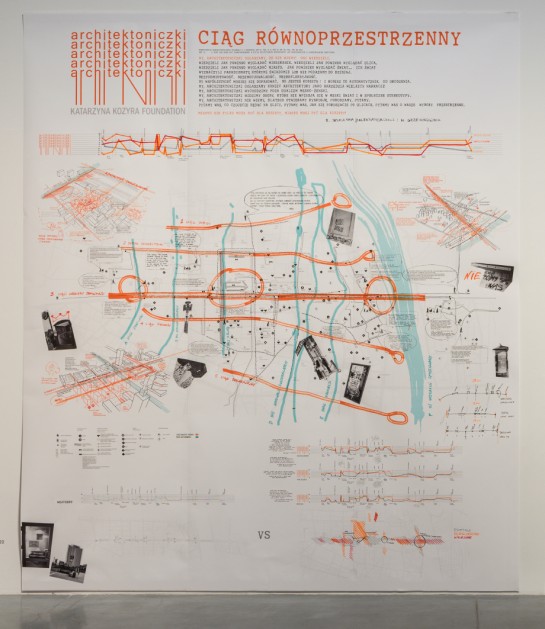The equal-space sequence is a visual record of a pedestrian's feelings in the space of the Avenue of Jerusalem. The method was developed in collaboration with feminist collectives from Barcelona, Berlin and Stockholm. As such, this street research technique questions what has so far been taken for granted in the space: both the urban and architectural arrangements as well as the place women occupy in them. By analysing the wellbeing of the users of different genders and their needs in the found environments, the Architecturalists attempt to predict the future direction of architecture and of the shared city spaces.
Architektoniczki
Architektoniczki: Ewelina Jaskulska, Joanna Aleksandrowicz, Honorata Grzesikowska.
The term Architektoniczki (female architects) was used before the Second World War to describe women who were active in the world of architecture. The aim of the interdisciplinary research project Architektoniczki, conducted at the Katarzyna Kozyra Foundation, is to show the influence of women on the development of urban spaces. Its initiators Ewelina Jaskulska, Joanna Aleksandrowicz and Honorata Grzesikowska want to define "equal space", which will answer the question: "What would a world created by women look like?". They note that the masculine pattern of understanding the world, the aftermath of which is capitalism, places men in the position of victims of the reality they have created. Women's architecture and urban planning, on the other hand, takes into account other aspects than just profit. Ecology, the revival of social needs or the recommitment of cities to the people become more important. By analysing changes in European cities and working with feminist collectives from Barcelona, Berlin and Stockholm, Architektoniczki - with the participation of sociologists, philosophers and artists - have developed a research methodology that has resulted in a 'spatial equation sequence' that subjects hitherto obvious spatial solutions to discussion. The methodology developed encompasses both urban and architectural layouts. In doing so, Architektoniczki define the future direction of architecture and shared urban spaces.
Ewelina Jaskulska is an architect with many years of professional experience. She is interested in the impact of architecture on the formation of local communities, as well as the situation of female architects in Poland as well as the problems that contemporary architecture is facing today. She took part in the development of the Rondo1 skyscraper in Warsaw and the Yset Tower skyscraper in Russia. She worked as project manager for Poland of the Stadium in Gdansk built for UEFA Euro 2012. In 2019, The European Centre for Architecture and Urban Studies included her in the "40 under 40" list - as a representative of the next generation of the most promising and developing design talents that will shape the space of the future. As of 2019, she is the co-founder of the research and design office MOLEKUŁY. Her designs have been exhibited nationally and internationally in Warsaw, Athens, London, Weimar, Munich, Paris and Chicago, among others. She is the winner of many international competitions.
Joanna Aleksandrowicz is an architect with many years of professional experience acquired in renowned Polish and foreign design studios. She participates in public discussions, during events such as Warsaw Home Expo, where she spoke in a panel on social and post-pandemic architecture. She has won international competitions and her designs have been exhibited in London and New York, among others. As of 2019, she is the co-founder of MOLEKUŁY- a research and design office.
Honorata Grzesikowska is an urban designer, architect and researcher, director at Guallart Architects. She studied architecture and urban planning in Poland and urban design in the Netherlands. She developed her skills by attending specialised courses at Westminster University in London. She works on international projects and has won competitions in urban planning, architecture and landscape design. Before joining Guallart Architects, she gained professional experience in architectural and urban design offices in Rotterdam and London. She has taught as an expert reviewer on master's courses in urban design at the Institute of Architecture and Urban Planning at the University of Liechtenstein and at the Institute of Advanced Architecture of Catalonia. She is the founder of Urbanitarian, a virtual library of urban scale projects.
Rok powstania: 2022
digital print on paper, magic marker

